All Things Therapy
For most of us with bipolar disorder, medication plays a critical role in managing our symptoms. However, therapy is also a vital component in the effective treatment of the condition.
I am passionate about sharing the benefits you can reap from therapy! So let me dispel some myths and tell you more about what you stand to gain.
Some questions and answers about therapy for bipolar
Question: Doesn't therapy mean you're weak?
Answer: To me, the willingness to be introspective in therapy is a huge sign of strength and maturity.
Question: Why can't I just talk to my friends and family?
Answer: Qualified therapists have years of training and expertise. Your friends and family may love you, but they aren't therapists. Additionally, friends and family can't always be objective, and you simultaneously have to navigate any feelings they have as well.
Question: But bipolar is a primarily neurobiological condition. How will talking about my feelings help?
Answer: Therapy for bipolar is so much more than just exploring your feelings. Read on...
Building a toolkit with the help of your therapist
You need a diverse toolkit to take charge of bipolar. Medication is one tool, but there are so many more you can make use of. Therapy helps with:
Learning your triggers and warning signs
An outside, informed perspective helps you identify factors that trigger episodes in order to avoid or manage them. Your therapist is a trained observer who can help you notice and learn your triggers and warning signs.
Cognitive reframing
Mania can involve distorted thinking patterns and depression can be driven by negative self-talk. Techniques from cognitive behavioral therapy allow you to challenge these thoughts and replace them with thoughts that are more true and more helpful.
Emotion regulation
Both in and out of episodes, people with bipolar disorder often have intense emotions. Therapy can give you the skills needed to navigate and manage these emotions more effectively, thereby preventing them from spiraling out of control or becoming overwhelming.
Social and circadian rhythm stabilization
Therapy will help you learn to regulate sleep/wake cycles, daily routines, and social activities in order to stabilize mood.
Interpersonal relationships
Maintaining relationships while living with bipolar disorder can present difficulties due to the unpredictable nature of the condition. Therapy teaches skills for communication and conflict resolution.
Staying accountable for healthy habits
We all know that regular sleep, a balanced diet, and exercise are crucial for managing bipolar disorder. Therapy provides support and a check-in to maintain these healthy habits.
Unpacking trauma with bipolar
If you have experienced trauma in your life, a qualified therapist can help you work through any impacts that it has had on you. In fact, living with a chronic condition like bipolar disorder can be a form of trauma in its own right that deserves space for healing.
What kinds of therapy are there?
Therapists undergo extensive training so they can adapt their treatment to each individual case. Your therapist will design a comprehensive treatment plan that addresses your specific needs and concerns. Different therapeutic approaches address various aspects of the condition. Here are some of the modalities shown to be effective in bipolar disorder.
- Psychoeducation– Teaches about your personal presentation of bipolar and what to expect from the condition.1
- Cognitive behavioral therapy (CBT)– Focuses on identifying and altering unhelpful thought patterns and behaviors.
- Interpersonal and social rhythm therapy (IPSRT)– Regulates sleep and wake cycles, routines, and social activities in order to stabilize mood.2
- Family-focused therapy (FFT)– Educates families about bipolar disorder and equips them with supportive strategies.
- Dialectical behavior therapy (DBT) – Develops mindfulness, distress tolerance, and emotional regulation skills.3
Living with bipolar disorder, finding a therapist
Ultimately, therapy is an investment in your long-term well-being, coping skills, and more. What are you waiting for – find a therapist today!
